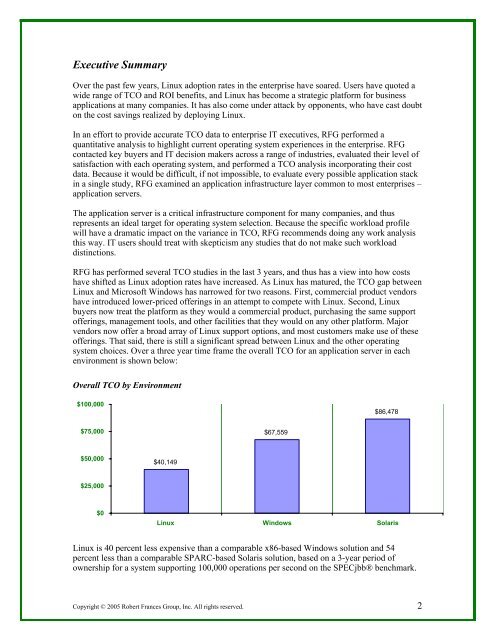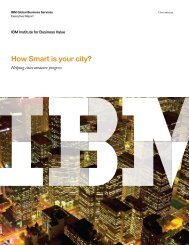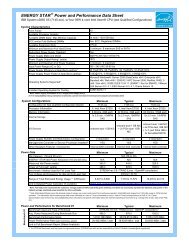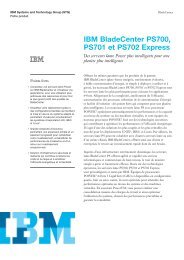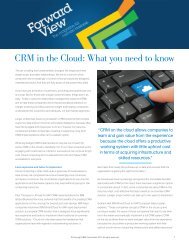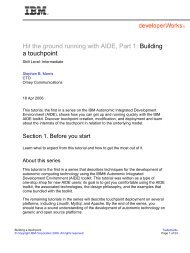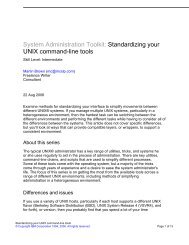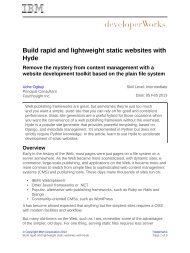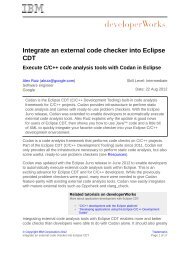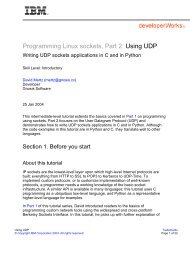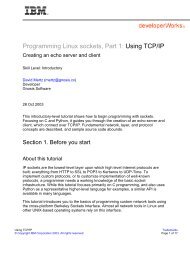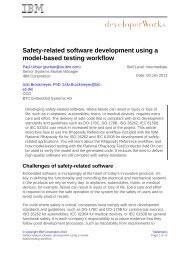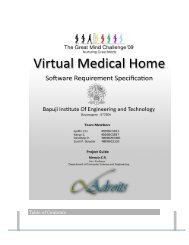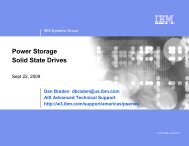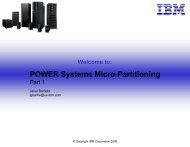TCO for Application Servers: Comparing Linux with Windows and ...
TCO for Application Servers: Comparing Linux with Windows and ...
TCO for Application Servers: Comparing Linux with Windows and ...
Create successful ePaper yourself
Turn your PDF publications into a flip-book with our unique Google optimized e-Paper software.
Executive Summary<br />
Over the past few years, <strong>Linux</strong> adoption rates in the enterprise have soared. Users have quoted a<br />
wide range of <strong>TCO</strong> <strong>and</strong> ROI benefits, <strong>and</strong> <strong>Linux</strong> has become a strategic plat<strong>for</strong>m <strong>for</strong> business<br />
applications at many companies. It has also come under attack by opponents, who have cast doubt<br />
on the cost savings realized by deploying <strong>Linux</strong>.<br />
In an ef<strong>for</strong>t to provide accurate <strong>TCO</strong> data to enterprise IT executives, RFG per<strong>for</strong>med a<br />
quantitative analysis to highlight current operating system experiences in the enterprise. RFG<br />
contacted key buyers <strong>and</strong> IT decision makers across a range of industries, evaluated their level of<br />
satisfaction <strong>with</strong> each operating system, <strong>and</strong> per<strong>for</strong>med a <strong>TCO</strong> analysis incorporating their cost<br />
data. Because it would be difficult, if not impossible, to evaluate every possible application stack<br />
in a single study, RFG examined an application infrastructure layer common to most enterprises –<br />
application servers.<br />
The application server is a critical infrastructure component <strong>for</strong> many companies, <strong>and</strong> thus<br />
represents an ideal target <strong>for</strong> operating system selection. Because the specific workload profile<br />
will have a dramatic impact on the variance in <strong>TCO</strong>, RFG recommends doing any work analysis<br />
this way. IT users should treat <strong>with</strong> skepticism any studies that do not make such workload<br />
distinctions.<br />
RFG has per<strong>for</strong>med several <strong>TCO</strong> studies in the last 3 years, <strong>and</strong> thus has a view into how costs<br />
have shifted as <strong>Linux</strong> adoption rates have increased. As <strong>Linux</strong> has matured, the <strong>TCO</strong> gap between<br />
<strong>Linux</strong> <strong>and</strong> Microsoft <strong>Windows</strong> has narrowed <strong>for</strong> two reasons. First, commercial product vendors<br />
have introduced lower-priced offerings in an attempt to compete <strong>with</strong> <strong>Linux</strong>. Second, <strong>Linux</strong><br />
buyers now treat the plat<strong>for</strong>m as they would a commercial product, purchasing the same support<br />
offerings, management tools, <strong>and</strong> other facilities that they would on any other plat<strong>for</strong>m. Major<br />
vendors now offer a broad array of <strong>Linux</strong> support options, <strong>and</strong> most customers make use of these<br />
offerings. That said, there is still a significant spread between <strong>Linux</strong> <strong>and</strong> the other operating<br />
system choices. Over a three year time frame the overall <strong>TCO</strong> <strong>for</strong> an application server in each<br />
environment is shown below:<br />
Overall <strong>TCO</strong> by Environment<br />
$100,000<br />
$75,000<br />
$50,000<br />
$25,000<br />
$0<br />
$40,149<br />
$67,559<br />
$86,478<br />
<strong>Linux</strong> <strong>Windows</strong> Solaris<br />
<strong>Linux</strong> is 40 percent less expensive than a comparable x86-based <strong>Windows</strong> solution <strong>and</strong> 54<br />
percent less than a comparable SPARC-based Solaris solution, based on a 3-year period of<br />
ownership <strong>for</strong> a system supporting 100,000 operations per second on the SPECjbb® benchmark.<br />
Copyright © 2005 Robert Frances Group, Inc. All rights reserved. 2


